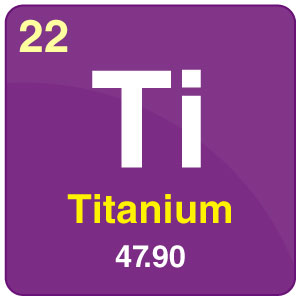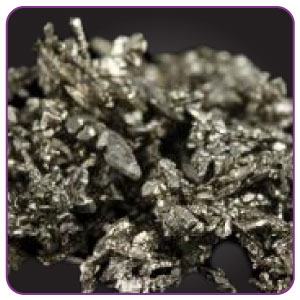Titanium

| Symbol | Ti |
| Atomic Number | 22 |
| Atomic Mass | 47.867 |
| Discovered by | Titanium was discovered by William Gregor |

Table of Contents
Chemical Properties Of Titanium
| Group | 4 | Melting point | 1941 K (1668 °C, 3034 °F) |
| Period | 4 | Boiling point | 3560 K (3287 °C, 5949 °F) |
| Block | d | Density (g cm−3) | 4.506 |
| Atomic number | 22 | Relative atomic mass | 47.867 |
| State at 20°C | Solid | Key isotopes | 48Ti |
| Electron configuration | [Ar] 3d24s2 | CAS number | 7440-32-6 |
| ChemSpider ID | 22402 | ChemSpider is a free chemical structure database | |
What is Titanium?
- Titanium with an atomic number of 22 is found in the Periodic Table with the symbol ‘Ti’.
- Titanium is a lustrous silver-coloured transition metal named after the Titans of Greek mythology.
- Discovered in 1791 in Cornwall, Great Britain by William Gregor.
- Titanium is less dense than steel but is equally strong.
- Ranking ninth on the list of most abundant metals on earth.
Uses Of Titanium
- Since titanium is one of those materials that resist corrosion, it is used mostly around salt water. The desalination plants that take in seawater and make fresh water are likely to equip a few pieces made with titanium.
- Aircraft: Being strong and lightweight, titanium is considered perfect for aircraft usage that needed lightweight metals so that it would be easy to lift and fly.
- Paints: Titanium oxide is one of many compounds that is used in many paints.
- Rocks and Minerals: Titanium most commonly occurs as the mineral ilmenite (a titanium-iron oxide mineral) and sometimes as the mineral rutile, a form of TiO2.
- Star Sapphire: Expensive gems like star sapphires have titanium in them.

Comments